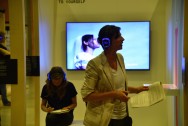The Body is a Battlefield
THURSDAY NIGHT 08/09 20:00
Our body is both our strength and our weakness. It is the thing with which we express and live our notion of ‘self’, but also what confines us: the body is the instrument through which society, politics and the state define us and impose identity.
Within the context of the exhibition The Life Fair. New Body Products* this evening will explore with several experts how we can claim the right to define our (changing) selves and how cultural, technological and legislative frameworks can both limit or permit this. With, among others, Jos de Mul, professor in Philosophical Anthropology at the Erasmus University, designer Simone C. Niquille and artist Philippine Hoegen.
*The exhibition The Life Fair takes the form of a trade fair offering products and services connected with various aspects of life such as love, sex, birth, identity, health, security and death. Curators Agata Jaworska and Giovanni Innella give visitors the opportunity to explore possibilities for improving their own bodies and lives but also confront them with the interests behind the products and services on offer.
Introduction by Philippine Hoegen: Why is the body a battlefield?
The body is the location in which a host of forces collide or relate, struggle for domination or are unified: The vegetative and the animal life, the state and the subject, the community and the individual, the biological category of human being and the Person. Definitions what we understand it is to be a person, have changed and oscillated over time and under the influence of different juridical systems (roman law is probably the first to use and attempt to define the term person), ideological systems (religion, political and social organisational forms), but also developments in science, philosophy, etc. The hegemonic narrative we tell ourselves about ourselves in a particular era and cultural and geographical context determines what call human, body, humanness, civil subject, individual, and that in which all these are presumed to come together: the person.
What is reasonably consistent within all these changing definitions however is that person is something more than the biological state. You develop and perform your personhood, it is a relational phenomenon that appears through interaction. It is human being PLUS, you might say: it is what individualizes and ‘humanizes’ the human body, or that which in a human being is other than and beyond the body. In the contemporary western context, under the influence of liberalism, came the conviction that ones person was ones own property: “ Every man has a property in his own person: this nobody has any right to but himself”, john Locke wrote in 1689. At the same time, precisely because personhood is a relational thing, something that is construed and confirmed through a social context, it can also be denied, dispossessed, a vulnerability that was and is exploited in scores of examples, Nazism perhaps the most obvious but not the most contemporary.
Whilst it is apparently possible to claim ownership over ones person, this is not so evident for the body, for example is not called bodyhacking for nothing. There are social taboes and juridical restrictions on what we can do with our ‘own’ bodies. In fact, our bodies, by law, are not technicaly our property at all. In a fascinating text called The Law of the Body, Meredith Render explains that:
"The law is silent on the question of the legal status of a living human body. A person, of course, enjoys a legal identity. A person’s blood, organs, tissue, sperm, and ovum can enjoy legal identities. A deceased body enjoys a legal identity. But a living body is omitted from this taxonomy."
She explains that: …lawmakers and courts have been severely limited in their ability to develop a law of the body, by a peculiar, almost superstitious, disinclination to assign the living human body a legal status. There exists an objection to defining the human body as mere property, as this debases it. The living human body too sacred to be classified as a thing that can be owned. And were we to legally recognize the human body (and its constituent parts) as a type of property, we would commodify it (or render it vulnerable to further commodification) and “thereby open the door to an array of terrible distributive consequences”. Writes Render.
Yet this thing, that is special and sacred, base and animalistic, this thing that is our body, is the site of furious activity. The state, the market and we ourselves, either as civil subjects , individuals or persons, are continuously developing an arsenal of methods, strategies and technologies to govern, exploit, enhance and mold our bodies.
The exhibition in which we are standing, shows us an excerpt of this arsenal.
















